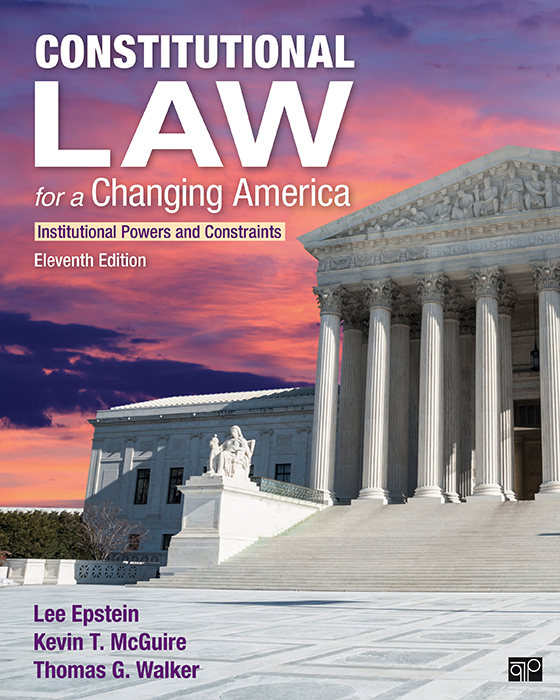Constitutional Law for a Changing America
Institutional Powers and Constraints
Lee J. Epstein - USC Gould School of Law
Thomas G. Walker - Emory University, USA
Kevin T. McGuire - The University of North Carolina at Chapel Hill, USA
This book is ideal for Constitutional Law courses in the two-semester sequence that covers powers and constraints. For courses that cover both rights and liberties and the separation of powers in one semester, see Constitutional Law for a Changing America: A Short Course.
Available formats
See what’s new to this edition by selecting the Features tab on this page. Should you need additional information or have questions regarding the HEOA information provided for this title, including what is new to this edition, please email sageheoa@sagepub.com. Please include your name, contact information, and the name of the title for which you would like more information. For information on the HEOA, please go to http://ed.gov/policy/highered/leg/hea08/index.html.
For assistance with your order: Please email us at textsales@sagepub.com or connect with your SAGE representative.
SAGE
2455 Teller Road
Thousand Oaks, CA 91320
www.sagepub.com
Instructor Resource Site
Online resources included with this text
The online resources for your text are available via the password-protected Instructor Resource Site, which offers access to all text-specific resources, including a test bank and editable, chapter-specific PowerPoint® slides.
Case Archive
http://edge.sagepub.com/epsteinpowers11e
The authors have excerpted each case in the same format as those in the text, featuring the justices’ votes, a summary of case facts, and a carefully edited version of the justices' opinions.
For additional information, custom options, or to request a personalized walkthrough of these resources, please contact your sales representative.
- Moves beyond traditional casebooks, this book combines the lessons of the legal model with the influences of the political process. This book includes information on the Supreme Court’s decision-making process, the structure of the federal judiciary, and briefing court cases.
- Delineates between commentary and opinion excerpts by providing a “Facts” and “Arguments” section before every case.
- Emphasizes the arguments raised by lawyers and interest groups and the politics surrounding litigation. The authors incorporate tables and figures on Court trends and other materials that bring out the rich legal, social, historical, economic, and political contexts in which the Court reaches its decisions.
- Demonstrates to students that Supreme Court cases involve real people engaged in real disputes by incorporating descriptions around the events that lead to the suits, including photographs of the litigants, relevant exhibits from the cases, and even the fate of particular litigants in the “Aftermath” boxes.
- “Global Perspectives” boxes broaden students’ perspectives on the U.S. legal system by allowing them to compare and contrast U.S. Supreme Court decisions with policies developed in other countries.
- This book is ideal for Constitutional Law courses in the two-semester sequence that covers powers and constraints. For courses that cover both rights and liberties and the separation of powers in one semester, see Constitutional Law for a Changing America: A Short Course.
Excerpts of recent Supreme Court decisions help students understand how these decisions have made fundamental changes in areas such as presidential power, separation of powers, and federalism.

